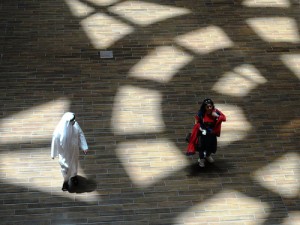 She changed her name from Juanita to Ellay the week after she moved to Dubai. Then she changed her hair from blonde to red-brown to black but refused to change her western style, showing her legs more often than she should.
She changed her name from Juanita to Ellay the week after she moved to Dubai. Then she changed her hair from blonde to red-brown to black but refused to change her western style, showing her legs more often than she should.
The last time I saw her, she was crying over rivers and bridges and slow border towns, the places of her childhood and her mother’s before. She was writing onto our dusty kitchen windowpane the names of the ex-husband who hit her, the first lover who proposed, the daughter she would leave behind. Me. She was tearing at the seams.
Now Juanita is gone, replaced by this Ellay, replaced by her somewhere in this rich filthy place. I walk through Dubai and think: rich man, poor man, prince, leper, millions of tons of pretty cardboard. The people here are like the wealth and construction: unstable, shallow. They have all changed their names at one time or another. This Ellay, no doubt, fits in here.
If I find her, I will call her only by her old name, but when I leave, she will take that from me, too. And then I will have no word to hold on to, just that feeling in my gut that she is gone, and the wonder of how long this Ellay will last in Dubai, will last in her heart, will last as the ghost of my mother.
If I find her, I will ask, is it summer? Where, then, is the sun? On New Year’s Day I awoke to dawn and you were gone, leaving only a note penned on the back of someone else’s holiday card.
All she wanted was to know the smell of the other side of the world, and the feel of the warm ocean’s ebb and flow, relying on gravity and moon rather than words and complicated relationships.
I hope that my search through these rich-poor streets will not be for nothing, that I will find my Juanita, my mama. Or, in failing at this, will find at least this Ellay.
Each path leads me to a new face of the city. Here, an old woman fetaled up against the western wall, napping silently in her upturned palms. There, an empty fountain and a long-limbed spider. The men in their dishdasha and their perfumes thicken the streets. And then, there, her, waiting tables at a tea shop on Al Wasi Road. She takes my hand and leads me to a chrome table away from everyone and suggests the Fujian green tea and some kind of Arabic pastries, as if she has not been gone.
I close my eyes and say in a breath, “What the fuck do I care about pistachio ghouribeh?” Exhale. Everything I have practiced is replaced by only this.
She points to her name tag, and it says Ellay, and now she eyes the table and says, “This, this Ellay, began in me a long time before I knew you. This Ellay, it would sound itself to me as I sank into sleep, before you. Before your father. Before Dubai.”
I twist a pressed linen napkin and look to the busy street for focus. “And what about me?” I ask. Then finally look to her, to the face of my mother. “Do you remember peeling clementines on the back porch?” I hold tight to this memory of citrus in January, the sweetness out of season.
She says, “It was the name, the old one. It never whispered to me beneath the cool California waves.” The old one, it never spoke to her at all.
Beth Thomas is a fiction and corporate writer working out of the desert southwest. She is on the editorial staff at SmokeLong Quarterly.
